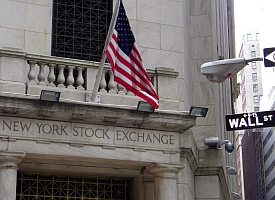A study indicates that changes in stock prices of companies in phase 3 clinical trials of their cancer drugs were associated with the outcomes of those trials in the period before the results were publicly announced. The findings of Allan Desky of Mount Sinai Hospital in Toronto, Canada and colleagues appear online in the Journal of the National Cancer Institute (paid subscription required), along with a commentary by Adam Feuerstein of TheStreet.com and Mark Ratain of University of Chicago.
Desky and his colleagues from medical faculties in Toronto conducted an analysis of stock prices of publicly traded biotechnology and pharmaceutical companies before and after key public announcements made between January 2000 and January 2009. The researchers focused on 23 positive and 36 negative phase 3 clinical trials in which their cancer drug was tested and from 41 positive and nine negative FDA regulatory decisions. Phase 3 trials are conducted with large (1,000 to 3,000 case) samples to confirm a treatment’s effectiveness, compare it to other commonly used treatments, and collect information on side effects and other factors involved with the safety of the experimental drug or treatment.
The team obtained stock prices from the Center for Research in Security Prices and Bloomberg Professional. The researchers then analyzed each company’s daily closing stock price before and after the date of a public announcement.
The results show the average stock price of a drug 120 days before a phase 3 clinical trial announcement increased by 13.7 percent for companies that reported positive trials and decreased 0.7 percent for companies that reported negative trials. The team also compared stock prices before and after FDA regulatory decisions. The results indicate that changes in company stock prices before FDA regulatory decisions did not differ statistically between companies with positive decision and companies with negative decisions.
In a separate analysis comparing average stock prices over the period from 120 to 60 days before clinical trial announcements to the average price for the subsequent 60 days, companies reporting positive trial results saw an average increase of 9.4 percent in their stock price, while the stock prices of those companies reporting negative trial results decreased by 4.5 percent, a statistically significant difference.
Using information not made public for stock transactions — i.e., insider trading — is a violation of the Federal Securities Exchange Act of 1934, thus the findings by Desky’s team that advance information from clinical trials may have been used in investment transactions are serious charges with criminal penalties, including prison time and severe fines. The authors note that the small number of cases in the study, the retrospective nature of the investigation, and potential selection bias suggest the findings be taken with caution.
The commentary by Feuerstein and Ratain point out business factors other than use of non-public information could have influenced the changes in stock prices. They analyzed the market capitalization — total market value of all outstanding company shares — of the companies in the study at 120 days before the public announcements of trial results.
Feuerstein and Ratain found the market cap of companies with positive trial results was 80 times larger than enterprises with negative results. Investors, they note, have greater confidence in larger drug companies with the resources and experience to carry out risky drug trials. Smaller companies, on the other hand, often face greater investor reluctance, which is reflected in a lower stock price.
Read more:
- Clinical Trial Record Security Deemed Inadequate
- Study: Industry Drug Trials Show More Favorable Results
* * *


 RSS - Posts
RSS - Posts
Couldn’t the rise or fall of a companies stock just be because of an increase or decrease of searches monitored by engines such as Google. Its been researched that stocks can be predicted by a search engine index (SEI that say Google uses. someone useing this method to predict stocks could see an increase volume in searches on a company or the drug being tested and misenturpet the extra traffic or lack of as the scientific community keeping an eye out rather than someone looking to predict the stock,